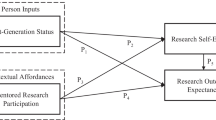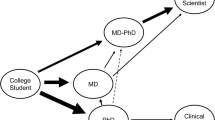Abstract
Women and people of color continue to be underrepresented among biomedical researchers to an alarming degree. Research interest and subsequent productivity have been shown to be affected by the research training environment through the mediating effects of research self-efficacy. This article presents the findings of a study to determine whether a short-term research training program coupled with an efficacy enhancing intervention for novice female biomedical scientists of diverse racial backgrounds would increase their research self-efficacy beliefs. Forty-three female biomedical scientists were randomized into a control or intervention group and 15 men participated as a control group. Research self-efficacy significantly increased for women who participated in the self-efficacy intervention workshop. Research self-efficacy within each group also significantly increased following the short-term research training program, but cross-group comparisons were not significant. These findings suggest that educational interventions that target sources of self-efficacy and provide domain-specific learning experiences are effective at increasing research self-efficacy for women and men. Further studies are needed to determine the longitudinal outcomes of this effort.

Similar content being viewed by others
References
Andrews, N. C. (2002). The other physician-scientist problem: Where have all the young girls gone? Nature Medicine, 8, 439–441.
Bakken, L., Sheridan, J., & Carnes, M. (2003). Gender differences among physician-scientists in self-assessed abilities to perform clinical research. Academic Medicine, 78, 1281–1286.
Bandura, A. (1986). Social foundations of thought and action. Englewood Cliffs, NJ: Prentice-Hall.
Bandura, A. (1997). Self-efficacy: The exercise of control. New York: Freeman.
Bickel, J., Wara, D., Atkinson, B., Cohen, L., Dunn, M., Hostler, S., et al. (2002). Increasing women’s leadership in academic medicine: Report of the AAMC Project Implementation Committee. Academic Medicine, 77, 1043–1061.
Bierema, L. (2001). Women, work, and learning. New Directions for Adult and Continuing Education, 92, 53–62.
Bieschke, K. J. (2006). Research self-efficacy beliefs and research outcome expectations: Implications for developing scientifically minded psychologists. Journal of Career Assessment, 14, 77–91.
Blustein, D. L. (1989). The role of goal instability and career self-efficacy in the career exploration process. Journal of Vocational Behavior, 35, 194–203.
Buckley, L., Sanders, K., Shih, M., & Hampton, C. (2000a). Attitudes of clinical faculty about career progress, career success and recognition, and commitment to academic medicine. Archives of Internal Medicine, 160, 2625–2629.
Buckley, L., Sanders, K., Shih, M., Kallar, S., & Hampton, C. (2000b). Obstacles to promotion? Values of women faculty about career success and recognition. Academic Medicine, 75, 283–288.
Carnes, M., Schuler, L., Sarto, G. E., Lent, S. J., & Bakken, L. (2006). Increasing sex and ethnic/racial diversity of researchers in aging: Some promising strategies at the postdoctoral level. Journal of the American Geriatric Society, 54, 980–985.
Dewey, J. (1938). Experience and education. New York: The MacMillan Company.
Dick, R. W., Manson, S. M., Hansen, A. L., Huggins, A., & Trullinger, L. (2007). The native telehealth outreach and technical assistance program: A community-based approach to the development of multimedia-focused health care information. American Indian and Alaska Native Mental Health Research: The Journal of the National Center, 14, 49–66.
FACTS: Applicants, matriculants and graduates. (2007). Retrieved July 19, 2007, from www.aamc.org/data/facts/2006/grads4table21.htm.
Final Report of the NAGMS Council MORE Division Working Group. (2006). Retrieved March 29, 2006, from www.nigms.nih.gov/News/Reports/MORECouncil_Jan2006.htm.
Flores, L., & O’Brien, K. (2002). The career development of Mexican–American adolescent women: A test of Social Cognitive Career Theory. Journal of Counseling Psychology, 49, 14–27.
Gainor, K. A., & Lent, R. W. (1998). Social cognitive expectations and racial identity attitudes in predicting the math choice intentions of Black college students. Journal of Counseling Psychology, 45, 403–413.
Gelso, C. J., & Lent, R. (2000). Scientific training and scholarly productivity: The person, the training environment, and their interaction. In S. Brown & R. Lent (Eds.), Handbook of counseling psychology (3rd ed., pp. 109–139). New York: John Wiley & Sons.
Gist, M. E., Stevens, C. K., & Bavetta, A. G. (1991). Effects of self-efficacy and post-training intervention on the acquisition and maintenance of complex interpersonal skills. Personnel Psychology, 44, 837–861.
Guelich, J. M., Singer, B. H., Castro, M. C., & Rosenberg, L. E. (2002). A gender gap in the next generation of physician-scientists: Medical student interest and participation in research. Journal of Investigative Medicine, 50, 412–418.
Hollingsworth, M. A., & Fassinger, R. E. (2002). The role of faculty mentors in the research training of counseling psychology doctoral students. Journal of Counseling Psychology, 49, 324–330.
Jagsi, R., Guancial, E., Worobey, C., Henault, L., Chang, Y., & Starr, R. (2006). The “gender gap” in authorship of academic medical literature—A 35-year perspective. New England Journal of Medicine, 355, 281–287.
Kahn, J. H. (2001). Predicting the scholarly activity of counseling psychology students: A refinement and extension. Journal of Counseling Psychology, 48, 344–354.
Kahn, J. H., & Scott, N. A. (1997). Predictors of research productivity and science-related career goals among counseling psychology doctoral students. The Counseling Psychologist, 25, 38–67.
Kelley, W. N., & Randolph, M. A. (Eds.). (1994). Careers in clinical research: Obstacles and opportunities. Washington, DC: National Academy Press.
Lent, R., Brown, S., & Hackett, G. (1994). Toward a unifying social cognitive theory of career and academic interest, choice and performance. Journal of Vocational Behavior, 45, 79–122.
Love, K. M., Bahner, A. D., Jones, L. N., & Nilsson, J. E. (2007). An invitation of early research experience and research self-efficacy. Professional Psychology: Research and Practice, 38, 314–320.
Luzzo, D., Funk, D., & Strang, J. (1996). Attributional retraining increases career decision-making self-efficacy. Career Development Quarterly, 44, 378–386.
Luzzo, D., & McWhirter, E. (2001). Sex and ethnic differences in the perception of educational and career-related barriers and levels of coping efficacy. Journal of Counseling & Development, 79, 61–67.
Manson, S. M. (2009). Personal journeys, professional paths: persistence in navigating the crossroads of a research career. American Journal of Public Health, 99, S20–S25.
Mullikin, E. A., Bakken, L. L., & Betz, N. E. (2007). Assessing research self-efficacy in physician-scientists: The Clinical Research Appraisal Inventory. Journal of Career Assessment, 15, 367–387.
Multon, K., Brown, S., & Lent, R. (1991). Relation of self-efficacy beliefs to academic outcomes: A meta-analytic investigation. Journal of Counseling Psychology, 38, 30–38.
Nathan, D., & Varmus, H. (2000). The National Institutes of Health and clinical research: A progress report. Nature Medicine, 6, 1201–1203.
Pett, M. A. (1997). Nonparametric statistics for health care research. Thousand Oaks: Sage Publications.
Promoting Translational and Clinical Science: The critical role of medical schools and teaching hospitals. (2006). Retrieved August 14, 2008, from http://www.aamc.org/research/clinicalresearch/start.htm.
Ragins, B., & Cotton, J. (1999). Mentor functions and outcomes: A comparison of men and women in formal and informal mentoring relationships. Journal of Applied Psychology, 84, 529–550.
Reck, S. J., Stratman, E. J., Vogel, C., & Mukesh, B. N. (2006). Assessment of residents’ loss of interest in academic careers and identification of correctable factors. Archives of Dermatology, 142, 855–858.
Ross-Gordon, J., & Brown-Haywood, F. (2000). Keys to college success as seen through the eyes of African American adult students. Journal of Continuing Higher Education, 48, 14–23.
Saks, A. M. (1995). Longitudinal field investigation of the moderating and mediating effects of self-efficacy on the relationship between training and newcomer adjustment. Journal of Applied Psychology, 80, 211–225.
Schaub, M., & Tokar, D. M. (2004). The role of personality and learning experiences in Social Cognitive Career Theory. Journal of Vocational Behavior, 66, 304–325.
Stalker, J. (1994). Athene in academe: Women mentoring women in the academy. International Journal of Lifelong Education, 13, 361–372.
Steele, C. M., & Aronson, J. (1995). Stereotype threat and the intellectual test performance of African Americans. Journal of Personality and Social Psychology, 69, 797–811.
Sullivan, K., & Mahalik, J. (2000). Increasing career self-efficacy for women: Evaluating a group intervention. Journal of Counseling & Development, 78, 54–62.
Tabachnick, B. G., & Fidell, L. S. (2001). Using multivariate statistics (4th ed.). Needham Heights, MA: Allyn & Bacon.
Taylor, K., & Betz, N. (1983). Applications of self-efficacy theory to the understanding and treatment of career indecision. Journal of Vocational Behavior, 22, 63–81.
Valian, V. (2000). Evaluating women and men. In Why So Slow? (pp. 125–144). Cambridge, MA: MIT Press.
Wang, M. (2005). Physician-scientists’ learning in communities of practice. Doctoral unpublished dissertation, University of Wisconsin, Madison, WI.
Watt, C. D., Greeley, S. A. W., Shea, J. A., & Ahn, J. (2005). Educational views and attitudes, and career goals of MD–PhD students at the University of Pennsylvania School of Medicine. Academic Medicine, 80, 193–198.
Wenger, E. (1998). Communities of practice: Learning, meaning, and identity. New York, NY: Cambridge University Press.
Williams, C. M., & Subich, L. M. (2006). The gendered nature of career related learning experiences: A Social Cognitive Career Theory perspective. Journal of Vocational Behavior, 69, 262–275.
Wong, E., Bigby, J., Kleinpeter, M., Mitchell, J., Camacho, D., Dan, A., et al. (2001). Promoting the advancement of minority women faculty in academic medicine: The National Centers of Excellence in Women’s Health. Journal of Women’s Health & Gender-Based Medicine, 10, 541–549.
Acknowledgements
This study was made possible through funding from the National Institutes of Health, National Institute of General Medical Sciences (R01 GM071918) and contributions from the College of Medicine, Howard University and the School of Medicine and Public Health Office of Continuing Professional Development and Department of Medicine at the University of Wisconsin-Madison. The authors wish to acknowledge the generous contributions of all the students, faculty and staff that have contributed to this project. We particularly wish to thank faculty who have led the intervention, Drs. Carnes, Sorkness and Maxwell, and members of our steering committee at Howard University, Drs. Kudlick, Harrell, Snell, Mouton, Smith and Henley. We further acknowledge the staff of the University of Wisconsin’s Clinical Investigator Program, Ms. Slonicker, Dr. Bauman and Ms. Zotalis, and Office of Continuing Professional Development, Ms. Mullikin and Ms. Rowin, and Howard University College of Medicine, Ms. Bruce-Moore, who have dedicated many hours to making this project possible. This project would not have occurred without the insights, coordination and team efforts of the numerous individuals involved.
Author information
Authors and Affiliations
Corresponding author
Rights and permissions
About this article
Cite this article
Bakken, L.L., Byars-Winston, A., Gundermann, D.M. et al. Effects of an educational intervention on female biomedical scientists’ research self-efficacy. Adv in Health Sci Educ 15, 167–183 (2010). https://doi.org/10.1007/s10459-009-9190-2
Received:
Accepted:
Published:
Issue Date:
DOI: https://doi.org/10.1007/s10459-009-9190-2




